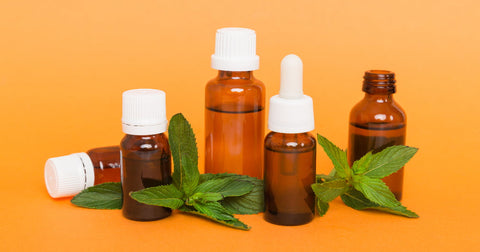Nausea, that queasy feeling in your stomach, can strike at any time, disrupting your day and leaving you feeling miserable. While over-the-counter medications and prescription drugs can offer relief, many are turning to natural remedies like essential oils to soothe nausea and restore digestive comfort.

This article explores the world of aromatherapy for nausea, highlighting the top 6 essential oils that can help alleviate queasiness and promote a sense of calm. We'll also delve into the science behind their effectiveness and provide practical tips for using them safely and effectively.
Essential Oils for Nausea: A Natural Approach
Essential oils are concentrated extracts derived from plants, capturing their aromatic and therapeutic properties. When inhaled or applied topically, these oils can interact with your body's systems, including the digestive and nervous systems, to promote well-being and alleviate various symptoms, including nausea.
Aromatherapy for Nausea: How It Works
The practice of using essential oils for therapeutic purposes is known as aromatherapy. When you inhale essential oils, the aromatic molecules stimulate your olfactory system, triggering signals in your brain that can influence your mood, emotions, and even physical sensations like nausea.
Top 6 Essential Oils for Nausea
1. Peppermint Oil:

- The Cooling Classic: Peppermint oil, with its refreshing and invigorating aroma, is a popular choice for relieving nausea. Its active compound, menthol, is known to have anti-nausea properties and can help calm the stomach.
2. Ginger Oil:
- The Digestive Soother: Ginger has been used for centuries to alleviate nausea and vomiting. Ginger oil can help reduce stomach contractions and ease digestive discomfort.
3. Lavender Oil:
- The Calming Companion: Lavender oil is renowned for its relaxing and calming properties. It can help reduce anxiety and stress, which can often contribute to nausea.
4. Lemon Oil:
- The Uplifting Citrus: Lemon oil's refreshing scent can help alleviate nausea and promote a sense of well-being. It's also known for its ability to reduce stress and anxiety.
5. Fennel Oil:

- The Digestive Aid: Fennel oil has been traditionally used to soothe digestive upset and reduce gas and bloating, which can contribute to nausea.
6. Chamomile Oil:
- The Gentle Soother: Chamomile oil's calming and anti-inflammatory properties can help ease nausea and promote relaxation.
Essential Oils for Stomach Bug: Soothing Relief
If you're battling a stomach bug, certain essential oils can help alleviate symptoms:
-
Peppermint oil: Can help reduce nausea and vomiting.
-
Ginger oil: Can soothe an upset stomach and reduce cramping.
-
Lemon oil: Can help with nausea and promote hydration.
How to Use Essential Oils for Nausea

-
Inhalation: Add a few drops of essential oil to a tissue or diffuser and inhale the aroma deeply.
-
Topical Application: Dilute essential oils in a carrier oil (like coconut oil) and apply to your temples, wrists, or abdomen.
-
Warm Compress: Add a few drops of essential oil to a warm compress and apply it to your stomach.
Where to Put Peppermint Oil for Nausea
For nausea relief, try applying diluted peppermint oil to your temples, wrists, or abdomen. You can also add a few drops to a diffuser or inhale it directly from a tissue.
Food Intolerance and Nausea: The Gut Connection
If you experience frequent nausea, even after trying aromatherapy, consider the possibility of food intolerances or sensitivities. These can trigger inflammation and disrupt your gut health, leading to nausea and other digestive symptoms.
A food sensitivity test kit can help you identify specific foods that might be contributing to your nausea. By eliminating or reducing these trigger foods, you can potentially alleviate your symptoms and improve your overall well-being.

Key Takeaways:
-
Essential oils like peppermint, ginger, and lavender can be effective natural remedies for nausea.
-
Aromatherapy works by stimulating the olfactory system and influencing brain signals.
-
Choose high-quality essential oils and use them safely, diluted in a carrier oil for topical application.
-
If you experience persistent nausea, consider a food sensitivity test to identify potential food triggers.
Disclaimer: This article is intended for informational purposes only and should not be considered a substitute for professional medical advice. If you have any concerns about your health or are experiencing persistent nausea, consult a qualified healthcare professional.
Frequently Asked Questions:
1. Are essential oils safe to use during pregnancy?
Some essential oils are safe during pregnancy, while others are not. It's crucial to consult your doctor or a qualified aromatherapist before using any essential oils during pregnancy, especially in the first trimester.
2. Can I ingest essential oils to relieve nausea?
Generally, it's not recommended to ingest essential oils without the guidance of a qualified aromatherapist or healthcare professional. Some essential oils can be toxic if ingested.
3. Where can I buy high-quality essential oils for nausea?
Look for reputable brands that offer pure, therapeutic-grade essential oils. Health food stores, online retailers specializing in aromatherapy, and even some pharmacies carry a selection of essential oils.
4. How can I tell if my nausea is caused by a food intolerance?
If you experience nausea or other digestive symptoms after eating certain foods, it could be a sign of a food intolerance. Keeping a food diary and noting your reactions can help identify potential triggers. You can also consider a food sensitivity test to pinpoint specific intolerances.
5. Besides aromatherapy, what are some other natural ways to relieve nausea?
Several natural remedies can help alleviate nausea, including:
- Drinking ginger tea or chewing on candied ginger
- Sipping peppermint tea
- Acupressure (applying pressure to specific points on the body)
- Staying hydrated with water or clear broths
- Getting fresh air and rest


.png?v=1737390083)
.png?v=1737187409)

